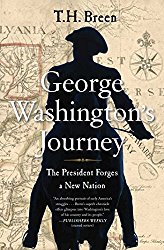Authors:
Historic Era: Era 3: Revolution and the New Nation (1754-1820s)
Historic Theme:
Subject:
Special Issue - George Washington Prize 2017 | Volume 62, Issue 4


Authors:
Historic Era: Era 3: Revolution and the New Nation (1754-1820s)
Historic Theme:
Subject:
Special Issue - George Washington Prize 2017 | Volume 62, Issue 4
The claim that “Washington slept here” is so ubiquitous in the historical community that it has become something of a running joke. But plenty of evidence exists that our first president was indeed a frequent traveler -- often rushing over muddy, pot-holed roads in a great white coach two centuries before Air Force One. During the last year, American Heritage has been conducting a survey of Revolutionary War taverns to be published later in 2017, and we've already found 38 establishments which claim that Washington stopped by, from Abbott Tavern in Andover, Massachusetts, to the William Pitt Tavern in Portsmouth, New Hampshire.
Reasons for the pirst president’s peregrinations have become much more clear with H.R. Breen’s new book, George Washington's Journey, excerpted here.
--The Editors
 Throughout history, revolutions have usually ended badly. The course of these events is all too familiar. After success on the battlefield, a sense of solidarity born of dreams of liberation and reform gives way to disappointment and fragmentation. We do not usually think of the American Revolution in these terms. After all, our revolution did not end badly. The American people not only achieved independence, but also established a constitutional republic that has survived for more than two centuries.
Throughout history, revolutions have usually ended badly. The course of these events is all too familiar. After success on the battlefield, a sense of solidarity born of dreams of liberation and reform gives way to disappointment and fragmentation. We do not usually think of the American Revolution in these terms. After all, our revolution did not end badly. The American people not only achieved independence, but also established a constitutional republic that has survived for more than two centuries.
We owe a lot to George Washington for this striking achievement. During his first term as president of the United States, he recognized the critical need to preserve the original goals of the Revolution. Fearful that the promise of national independence would slip away, he insisted on creating a powerful union capable of overcoming internal division. George Washington's Journey recounts how he devised a boldly original plan to promote a strong central government during a time of political peril.
We study Washington's journey today to recapture a sense of national purpose and unity that has gone missing from the ongoing conversation between our country's elected leaders and the American people. It is true, of course, that Washington's appeal for solidarity often fell on deaf ears. Unlike him, we know what the future held for the country after his presidency. Civil war almost destroyed the union he worked so hard to preserve. Local concerns have repeatedly trumped comprehension of the common good. Political parties have stimulated heated debate, which sometimes has led to the utter paralysis of the government. Whatever the threats to the nation have been, Washington's travels remind us, now more than ever before, of the enduring need for the American people to pull together to recover the original promise of the Revolution. For us, that is his message.
During his first days in office, Washington organized a journey that shaped how the American people perceived their relationship with the new federal government. Drawing on his immense popularity, Washing-ton envisioned an ambitious tour of the United States as a way to trans-form the abstract language of the Constitution into a powerful, highly personal argument for a strong union. At a key moment in our country's history when the very survival of